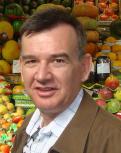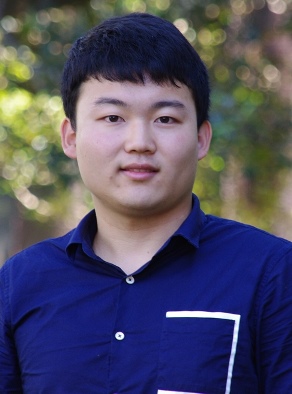| Dr. Silvio Alexandre Beisl Vieira de Melo (Visiting Professor, 2012) |
 |
|
| Education |
- PhD in Chemical Engineering - Federal University of Rio de Janeiro (COPPE-UFRJ), Rio de Janeiro, Brazil (1997)
- M.Sc. in Chemical Engineering - Federal University of Rio de Janeiro (COPPE-UFRJ), Rio de Janeiro, Brazil (1994)
- B.Sc. in Chemical Engineering - Federal University of Bahia (UFBA), Salvador, Bahia, Brazil (1992)
|
| Main Research |
Supercritical fluid processes for the natural products extraction. High-pressure phase equilibria. Experimental determination, modeling and simulation of kinetics for separation processes. Simulation of high-pressure phase equilibrium behavior with cubic equations of state and mixing rules that incorporate group contribution activity coefficient models. Transesterification of vegetable oils in supercritical fluids. Dense gas processes for the formation of nano and micro-particles with narrow particle size distribution, applied to the formulation of pharmaceutical compounds. Nanoparticles encapsulation in supercritical fluid medium for controlled drug delivery systems. |
| Work Experience |
- 2006-Present: Associate Professor, Department of Chemical Engineering, Polytechnic School, Federal University of Bahia (UFBA), Salvador, Bahia, Brazil.
- 2003-2005: Scientific Director, Sergipe State Foundation for Research and Technology (FAP-SE), Aracaju, Sergipe, Brazil.
- 1999-2006: Assistant Professor, Institute of Science and Technology, Tiradentes University (UNIT), Aracaju, Sergipe, Brazil.
- 1997-1999: Research Fellow, Department of Chemical Engineering, Polytechnic School, Federal University of Bahia (UFBA), Salvador, Bahia, Brazil.
- 1994-1996: Visiting Fellow, University of Padova, Italy.
|
| |
|
| Dr. Adam Carr (Alumni-PhD submitted 2010) |
 |
|
| Education |
- PhD (2007 to 2010)
- B.E. (Chemical) - University of Sydney
|
| Project Title |
Subcritical water as a novel processing medium for the manufacturing of micronized biomaterials |
| Project Description |
This project looks into investigating whether subcritical water may be used as a processing fluid for pharmaceuticals. Subcritical water has been used for extractions of bio-active compounds for neutraceuticals. Examples include anti-oxidants from oregano, essential oils from Thymbra Spicata, damnacanthal from noni roots, and proteins from various other sources. These examples have shown that, not only are high recoveries possible, but that degradation of functional activity due hydrolysis of the active structure was not an issue. It therefore seemed plausible to use subcritical water to dissolve a number of pharmaceuticals and attempt to increase the bioavailability of the compounds (via micronization or encapsulation). This was to be achieved using a bottom-up type process. By dissolving a number of model pharmaceuticals in water, and triggering a rapid precipitation of said compounds, particles of micron-nano size with narrow particle size distributions may be possible. The process is similar in many ways to a supercritical anti-sovent type system. However this method does not rely in the intense change in density and permeability of SC-CO2, but rather relies on the changing polarity of water with temperatures change. The project has already demonstrated that micronization of crystalline pharmaceuticals is possible, and that particle with narrow particle size distribution may be achieved. A range of pharmaceuticals (anti-inflammatories, anti-cancers, analgesics, and stimulants) are being trialled using this method currently, with promising results. |
| Work Experience |
- 2006, Qenos on USYD Scholarship Project (MIPPS)
|
| Publications |
- Adam G. Carr, Raffaella Mammucari, Neil R. Foster, The Solubility and Micronization of Griseofulvin in Subcritical Water. Industrial & Engineering Chemistry Research 2010. 49(7): p. 3403-3410)
|
| Presentations |
- AICHE 2007 annual meeting, Subcritical Water as a Novel Fluid for Pharmaceutical Processing and Drug Delivery Formulation
- ICONN 2008, Subcritical water as an innovative green fluid for the manufacturing of micronized biomaterials
- ISSF 2009, Controlled Precipitation of Hydrophobic-Pharmaceuticals in Subcritical Water. Poster and Conference Proceedings.
|
| Awards |
- 2006 CHEMECA Aker Kvaerner award for best undergraduate plant design
- 2006 Design award for best plant design (University of Sydney)
- 2007, Runner-up National Student Sustainability Award, awarded by the Society for Sustainability and Environmental Engineering (SSEE) (group leader)
- 2009, Postgraduate Research Travel Scholarship to International Symposium of Supercritical Fluids, Arcachon, France
- 2010, Finalist, Inventor of the Year Awards (Winner announced September 2nd 2010)
|
| |
|
| Dr. Grace Teoh (PhD Student-PhD Submitted 2012) |
 |
|
| Education |
B.E. (Hons.Chemical) - Universiti Kebangsaan Malayasia 2001 |
| Project Title |
Nanomedicine applications using dense gas technology |
| Past Projects |
- Assessment of the WEEE Directive and its Implementation in the UK, and Implications for Precious Metals using Sustainability Criteria. 2006
- Aplikasi Teori Larutan Cair (Dilute Solution Theory) di dalam Meramalkan Kebolehlarutan Bahan Organik di dalam Bendalir Superkritikal (translated: Application of the Dilute Solution Theory in Predicting the Solubility of Organic Compounds in Supercritical Fluids). 2001
|
| Publications |
- M. Markom, Teoh Wen Hui. 2007. Solution predictability of low volatile solutes in supercritical carbon dioxide in the absence of saturation pressure data. Journal of Supercritical Fluids 40 (2007) 170-175
- M. Markom, W.H. Teoh, W.R. Wan Daud. 2002. Saturation Pressure Estimation of Low Volatile Organic Compounds in Supercritical Fluids. Asia Pacific Conference on Chemical Engineering (APPCChe) 2002
- Wen Hui Teoh and Masturah Markom. 2001. Predicting the Solubility of Solutes in Supercritical Carbon Dioxide Using Dilute Solution Theory in the Absence of Saturation Pressure Data. 15th Symposium of Malaysian Chemical Engineers SOMChe 2001
|
| Work Experience |
- Dec 2006 - August 2008: Lecturer, Universiti Tunku Abdul Rahman, Malaysia
- August 2001 - Sept 2005 : Research and Development Executive , Asahi Chemical Research Lab
|
| Awards |
- Dean List (2000/2001)
- Shell Centenary Chevening Scholarship (2005/2006) to the University of Cambridge, UK
|
| |
|
| Michael Chun Hin Wong (Internship Finished 2014) |
 |
|
| Education |
Bachelor of Chemical Engineering, UNSW, 2008-Present |
| Project Title |
Microfluids Application to Particle Engineering
|
| Project Description |
Supercritical fluid micronization process reduces the number of steps required to achieve micron-sized particles compares to conventional techniques. The use of subcritical water instead of solvents eliminates the extraction of solvent in the final product. The aim of the project is to alter the variables (temperature and flow-rates) to determine the size and morphology of precipitated particles in micron-scales.
|
|
| Sean Hongqing Zhuang (Internship Finished 2014) |
 |
|
| Education |
Bachelor of Chemical Engineering, China University of Petroleum, 2010-Present |
| Project Title |
Design and production of devices for the controlled release of therapeutics |
| Project Description |
The aim of this project if to pursue the development of an improved formulation for the controlled release of the therapeutics entities through the design of a polymer-based device. The device will be produced by a hybrid conventional/dense gas process. |





